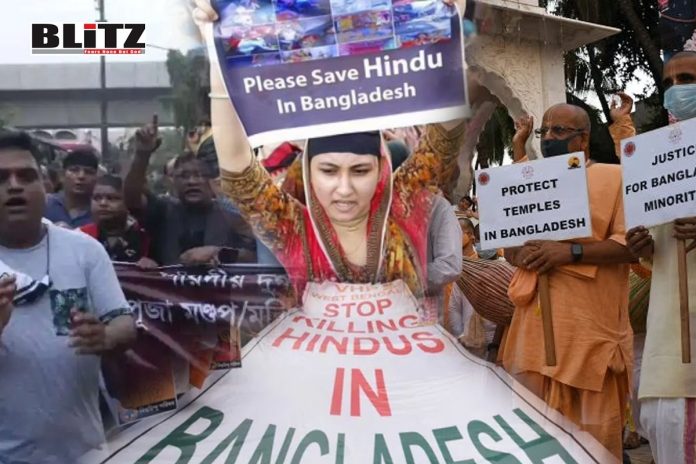While journalist Alo Pal in an article, describing the fate of her ancestral property in Bangladesh wrote, “The house in Bashudebpur, in Bangladesh’s Rajshahi district, where my father was born, still stands. Shrouded in the omen that “there dwells a god”, no one dares tear it down for fear of death or affliction in the family”, Utpal Kumar wrote in FirstPost, “A Bangladeshi Hindu may today feel dejected at two levels. One, he belongs to religion which has just one country to look up to — for help, survival and more. (While Muslims are in majority in 49 nations, the number for Christians easily breaches the three-figure mark). And that one country and its inhabitants are largely indifferent to their plight. Two, a Bangladeshi Hindu is seen to be carrying the baggage of being the civilizational part of Bharat, which no longer cares for him”.
Such worrying story of Hindus in Bangladesh has been penned by Dr Avishek Biswas, Assistant Professor, Vidyasagar College (Calcutta University) and eminent journalist Deep Halder in their book – ‘Being Hindus in Bangladesh’.
Although one of Bangladesh constitution’s core principles is secularism, following the tragic assassination of Bangabandhu Sheikh Mujibur Rahman on August 15, 1975, subsequent military rulers – Gen Ziaur Rahman and Gen Hussain Muhammad Ershad had made frantic bids in turning the country into an Islamist state or pseudo-Pakistan by advancing anti-India and anti-Hindu sentiment thus making Islam the state religion of the country that defies rights of religious minorities – particularly Hindus. And that is the reason, Hindus in the country are facing persecution for decades – where perpetrators of such heinous acts are not only members of ultra-Islamist and Al Qaeda-connected Bangladesh Nationalist Party (BNP) or pro-Pakistan Jamaat-e-Islami (JeI), leaders and activists of other political forces in the country too are involved in such acts.
Deep Halder, one of the authors of ‘Being Hindus in Bangladesh’ was asked – In 1971, Bengalis fought the war of independence against Pakistani occupation forces and liberated the country at the sacrifice of three million lives, where between 3-4 hundred thousand girls and women faced sexual violence. During the war, Bengalis, irrespective of their religious identities fought together. Bangladesh is supposed to be a country of Bengalis. This was the key spirit of the liberation war. But, after 53 years of independence, why we are witnessing persecution of Hindus, illegally grabbing their properties and treating Hindus as “enemies”? Do you think, such notorieties are result of rise of radical Islam and jihadism in Bangladesh? How we can effectively confront such vicious actions?
In response he said, “There exists within Bangladesh two broad ideas of Bangladesh. The idea of 1947 and the idea of 1971. The same landmass was East Pakistan once and Bangladesh later. When the West Pakistan army came to East Pakistan to put down the revolt for language, cultural and political autonomy of East Pakistanis, there were forces inside East Pakistan that supported the army. The Jamaat-e-Islami, the Al Badr militias, Rajakar mercenaries and local collaborators including members of “Peace Committee”. In the genocide that followed, many East Pakistanis stood and watched their fellow women and men being butchered without batting an eyelid. The question is – did the idea of Bangladesh percolate into every nook and cranny of the new country after 1971? The answer perhaps is no. And therein lies the problem. There are forces, both political and social, even in today’s Bangladesh that would want a non-secular state, a more Islamic identity just like the West Pakistan army wanted in 1971.Their ways may be different, but the goal is the same: to stamp out the Hindu or make him a second class citizen”.
Replying to the same question, Dr Avishek Biswas, co-author of the book said, “For the West Pakistani forces, Liberation war of 1971 was a battle between the Pure and the Impure. Hence, they believed the movement and sacrifice for Bengali as the ‘lingua-franca’ was also a reflection of that impure origin. In 1967, a ban was imposed on broadcasting Tagore’s songs on the government-controlled Radio Pakistan and this was opposed by Bengali students and intelligentsia. The central government of Pakistan (controlled by West Pakistan) believed that East Pakistan needed to be purged of anything which is remotely Bengali or ‘Hinduani’. 1971 was a rebellion against all these elements. But unfortunately, the forces operative during 1970-71 against the Liberation war movement headed by Mujib and his allies started their infiltration towards the newly created Bangladesh after the assassination of Mujibur Rahman. The forces who championed the Liberation was got jeopardized after 1975. In the last 50 years this has resulted in a gradual rise of radical Islam and Jihadism throughout Bangladesh. The worst sufferer of this is the Hindu community of Bangladesh. The only solution to this problem is the re-awakening of the ideology that gave birth to this country called Bangladesh- “Amar sonar Bangla” (my golden Bengal)”.
On social media platforms, agents of radical Islam, jihadism and pro-Pakistan forces would make well-orchestrated efforts of rejecting the book – ‘Being Hindus in Bangladesh’ as “propaganda” or lies. This is the classic pattern of how such cases are muted or suffocated by the mighty forces of radical Islam. To those evil forces, Dr Avishek Biswas and Deep Halder are “liars” or “conspirators”. They will make sure; copies of this book do not reach a large segment of people in Bangladesh who are not willing to look into the cases of Hindus in the country through the lenses of Islamists and religious bigots. For this particular reason – it is important that copies of ‘Being Hindus in Bangladesh’ deserves to reach the desks of journalists, research-scholars, historians and key figures in the government as well as members of Bangladesh Parliament. By reading this book, we need to understand the issue and take necessary steps so that Hindus in Bangladesh are no more treated wrongly.




